 I came across an amusing piece the other day which I’d seen before, enjoyed, then forgotten. I’ll excerpt a bit so you can get the idea even if you don’t read the full thing right this minute.
I came across an amusing piece the other day which I’d seen before, enjoyed, then forgotten. I’ll excerpt a bit so you can get the idea even if you don’t read the full thing right this minute.
Announcement Regarding the Bureau of Caucasian Affairs – BCA
United Native Americans (UNA) is proud to announce that it has bought the state of California from the whites and is throwing it open to Indian settlement. UNA bought California from three winos found wandering in San Francisco. UNA decided the winos were the spokesmen for the white people of California. These winos promptly signed the treaty, which was written in Sioux, and sold California for three bottles of wine, one bottle of gin, and four cases of beer…
Of course, whites will be allowed to sell trades and handicrafts at stands by the highway. Each white will be provided annually with one blanket, one pair of tennis shoes, a supply of Spam, and a copy of The Life of Crazy Horse…
All courses will be taught in Indian languages, and there will be demerits for anyone caught speaking English. All students arriving at the school will immediately be given IQ tests to determine their understanding of Indian Language and hunting skills… Each hospital will have a staff of two part-time doctors and a part-time chiropractor who have all passed first aid tests. And each hospital will be equipped with a scalpel, a jack knife, a saw, a modern tourniquet, and a large bottle of aspirin.
Certain barbaric white customs will, of course, not be allowed. Whites will not be allowed to practice their heathen religions, and will be required to attend Indian ceremonies. Missionaries will be sent from each tribe to convert the whites on the reservations. White churches will either be made into amusement parks or museums or will be torn down and the bricks and ornaments sold as souvenirs and curiosities…
 It’s effective satire. It bites enough to hurt, but it’s still funny. It’s what John Stewart does when he’s at his best – throwing out a little red meat to those who already agree, and sharply prodding those who don’t, moderated somewhat by humor.
It’s effective satire. It bites enough to hurt, but it’s still funny. It’s what John Stewart does when he’s at his best – throwing out a little red meat to those who already agree, and sharply prodding those who don’t, moderated somewhat by humor.
But sarcasm and hyperbole are risky if you’re serious about changing minds (as opposed to being funny or venting a tiny bit of rage). If they work, they really really work – but if they don’t, they alienate and offend. Risk big, win big – or, you know, fail.
Sometimes we have to consciously decide whether we’d rather be right or be effective. Standing our ground on moral absolutes is all well and good – and sometimes the only acceptable choice if we’re to live with ourselves. But are there pathways to positive change that don’t require either the complete submission of our adversaries or sacrifice of our own foundational values?
 In 1851, a largely unknown former slave going by the name ‘Sojourner Truth’ took the stage at a women’s rights convention in Akron, OH. There are several versions of her exact words, but something pretty close to this segment shows up in all of them:
In 1851, a largely unknown former slave going by the name ‘Sojourner Truth’ took the stage at a women’s rights convention in Akron, OH. There are several versions of her exact words, but something pretty close to this segment shows up in all of them:
I have heard much about the sexes being equal; I can carry as much as any man, and can eat as much too, if I can get it. I am as strong as any man that is now.
As for intellect, all I can say is, if woman have a pint and a man a quart — why can’t she have her little pint full? You need not be afraid to give us our rights for fear we will take too much — for we won’t take more than our pint will hold.
The poor men seem to be all in confusion and don’t know what to do. Why children, if you have woman’s rights give it to her and you will feel better. You will have your own rights, and there won’t be so much trouble.
There are two things about this argument which I really like and from which I hope to learn.
First, Truth doesn’t pick fights she doesn’t need to or take on battles she probably can’t win. She works as much as most men? That’s easily verifiable. But intellect… that’s trickier. How would you even measure that? They didn’t have Common Core back then, or IQ tests, or even those ‘Which Failed 1970’s Sitcom Are You?’ quizzes.
Truth doesn’t bother arguing what she cannot prove. IF a woman has a pint only, while you men have quarts – fine. Why not let us fill up our little pints?
That’s much more difficult to refute. She gives her detractors little to kick against, while still claiming the rights for which she’s orating.
Second, Truth frames what she wants in terms compatible with her opponents’ needs – “the poor men… don’t know what to do.” Let the ladies have their little rights and you’ll feel better. They’re not wanting so very much. You need not sacrifice much to appease us. Things can get back to normal.
Sometimes it’s a bit more layered…
 In 1830, a “Workingman’s Committee” was assembled in Philadelphia to “ascertain the state of public instruction in Pennsylvania” and propose improvements. Whatever their official status, their report reads like blue collar fathers wanting better for their children:
In 1830, a “Workingman’s Committee” was assembled in Philadelphia to “ascertain the state of public instruction in Pennsylvania” and propose improvements. Whatever their official status, their report reads like blue collar fathers wanting better for their children:
It is true the state is not without its colleges and universities, several of which have been fostered with liberal supplies from the public purse. Let it be observed, however, that the funds so applied, have been appropriated exclusively for the benefit of the wealthy, who are thereby enabled to procure a liberal education for their children, upon lower terms than it could otherwise be afforded them.
And you thought vouchers were a brand new scheme.
The Committee could argue for better funding so their kids would have more opportunity, lead richer lives, get better jobs. They could even bust out terms like “college and career ready.” But I suspect they knew those with political and economic power cared little for such things, whatever lip service may have been paid. They had to find something their targets DID care about – a common cause which could still nudge along their specific hopes:
Funds thus expended, may serve to engender an aristocracy of talent, and place knowledge, the chief element of power, in the hands of the privileged few; but can never secure the common prosperity of a nation nor confer intellectual as well as political equality on a people.
 Whoa there, cowboy – an aristocracy of what?!
Whoa there, cowboy – an aristocracy of what?!
The original element of despotism is a MONOPOLY OF TALENT, which consigns the multitude to comparative ignorance, and secures the balance of knowledge on the side of the rich and the rulers. If… the healthy existence of a free government be… rooted in the WILL of the American people, it follows… that this monopoly should be broken up, and that the means of equal knowledge, (the only security for equal liberty) should be rendered, by legal provision, the common property of all classes.
They called on shared ideals. Who was going to argue against “of-the-by-the-for-the”?
 This is a common tactic used still today, although often much less convincingly. Every time a politician or business leader speechifies that “what Americans want is _______” or proudly proclaim they “BELIEVE in buzzword, patriotic catchphrase, and congruent parallel third item!” they’re trying to use shared values to persuade. They just do it so badly it makes us hate them.
This is a common tactic used still today, although often much less convincingly. Every time a politician or business leader speechifies that “what Americans want is _______” or proudly proclaim they “BELIEVE in buzzword, patriotic catchphrase, and congruent parallel third item!” they’re trying to use shared values to persuade. They just do it so badly it makes us hate them.
But this committee did it beautifully.
In a republic, the people constitute the government, and by wielding its powers in accordance with the dictates, either of their intelligence or their ignorance; of their judgment or their caprices, are the makers and the rulers of their own good or evil destiny…
It appears, therefore, to the committees that there can be no real liberty without a wide diffusion of real intelligence; that the members of a republic, should all be alike instructed in the nature and character of their equal rights and duties, as human beings, and as citizens; and that education, instead of being limited as in our public poor schools, to a simple acquaintance with words and cyphers, should tend, as far as possible, to the production of a just disposition, virtuous habits, and a rational self-governing character…
Like I said before, I’m all for standing unashamed on your convictions. There are times when budging one more inch is simply unacceptable! Immoral! When we’d rather fail with flair than move forward in shame and the ignominy of “compromise”!
 On the other hand, if your goal is to change something, we may need to set aside such glories for a bit. The Committee at some point had to decide whether they cared more about venting their true spleen regarding inequity and the power structure of the society around them, or improving education in a meaningful way for their kids.
On the other hand, if your goal is to change something, we may need to set aside such glories for a bit. The Committee at some point had to decide whether they cared more about venting their true spleen regarding inequity and the power structure of the society around them, or improving education in a meaningful way for their kids.
Sound familiar?
Listen to those whose cooperation you require. What’s important to them? What common ground do you share? At the very least, what argument will they find hardest to deny or refute?
“In a republic, the people constitute the government” may or may not be entirely true in practice, but it’s a hell of an argument, and one no good ‘Merican is likely to openly oppose. “We don’t want dumb people ruining things for everyone else” is particularly savvy if your target audience is made up of the rich and powerful who tend to be tired of, well… dumb people ruining things for everyone else.
Remember “island-hopping” in WWII? We don’t always need to win every part of every battle. Why sacrifice actual progress for idealistic – er… for letting ourselves end up in – well…
 Is there a culturally appropriate term for ‘Chinese finger traps’?
Is there a culturally appropriate term for ‘Chinese finger traps’?
Sometimes the best arguments are made by taking an existing idea or text and substituting, like the Declaration of Sentiments did for women’s rights, but it’s not a particularly entertaining read. And sometimes a little outrage and passion can grab hearts and minds, circa William Lloyd Garrison.
But honesty can still be subtle. Persuasion can be intelligently coy, surely.
Your assignment for next time: an excerpt from Harriet Jacobs, an escaped slave who wrote of her experiences and published them in 1861. What does she want? How does she use vocabulary and shared ideals to convey her feelings and nudge a variety of readers towards her worldview? In what ways does this excerpt demonstrate the importance of HOW we write as much as WHAT we write about?
 It’s serious stuff, on a subject worthy of outrage. I respectfully suggest she gives us something better – effectiveness.
It’s serious stuff, on a subject worthy of outrage. I respectfully suggest she gives us something better – effectiveness.
I’ll expect your analysis typed and double-spaced, on my desk by morning – or NO STICKER FOR YOU.
I now entered on my fifteenth year–a sad epoch in the life of a slave girl. My master began to whisper foul words in my ear. Young as I was, I could not remain ignorant of their import… I turned from him with disgust and hatred. But he was my master. I was compelled to live under the same roof with him–where I saw a man forty years my senior daily violating the most sacred commandments of nature. He told me I was his property; that I must be subject to his will in all things. My soul revolted against the mean tyranny.
But where could I turn for protection? No matter whether the slave girl be as black as ebony or as fair as her mistress. In either case, there is no shadow of law to protect her from insult, from violence, or even from death; all these are inflicted by fiends who bear the shape of men. The mistress, who ought to protect the helpless victim, has no other feelings towards her but those of jealousy and rage.
The degradation, the wrongs, the vices, that grow out of slavery, are more than I can describe. They are greater than you would willingly believe. Surely, if you credited one half the truths that are told you concerning the helpless millions suffering in this cruel bondage, you at the north would not help to tighten the yoke. You surely would refuse to do for the master, on your own soil, the mean and cruel work which trained bloodhounds and the lowest class of whites do for him at the south.
Oh – #11FF BCE Coffee Cup if you really submit something (email or comment below) before I follow up with mine. They are rare and coveted – and the next one could be yours.
RELATED POST: By Any Means Necessary

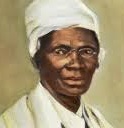 One of the most unique and interesting speeches of the Convention was made by Sojourner Truth, an emancipated slave. It is impossible to transfer it to paper, or convey any adequate idea of the effect it produced upon the audience. Those only can appreciate it who saw her powerful form, her whole-souled, earnest gesture, and listened to her strong and truthful tones. She came forward to the platform and addressing the President said with great simplicity:
One of the most unique and interesting speeches of the Convention was made by Sojourner Truth, an emancipated slave. It is impossible to transfer it to paper, or convey any adequate idea of the effect it produced upon the audience. Those only can appreciate it who saw her powerful form, her whole-souled, earnest gesture, and listened to her strong and truthful tones. She came forward to the platform and addressing the President said with great simplicity: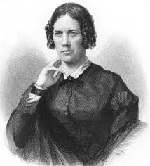 Twelve years later, Frances Gage – a well-known reformer, abolitionist, and feminist in her own right – recounted the event somewhat differently. Gage was present at the convention, and was in fact the President to whom Truth addressed her initial request to speak. The version Gage recorded has become much better known, and is the one most often replicated, laminated, and recited when we speak of Truth today.
Twelve years later, Frances Gage – a well-known reformer, abolitionist, and feminist in her own right – recounted the event somewhat differently. Gage was present at the convention, and was in fact the President to whom Truth addressed her initial request to speak. The version Gage recorded has become much better known, and is the one most often replicated, laminated, and recited when we speak of Truth today.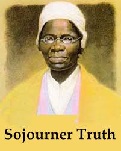 Maybe it was impossible to transfer the effect to paper, but Gage could try. I submit that she altered the facts in order to capture the truth. Recounting the event was inadequate, so she revamped it in order to get closer to what actually happened experientially. In her mind, I believe, the most important element of Truth’s speech that night was not the transcript, but the message and its impact.
Maybe it was impossible to transfer the effect to paper, but Gage could try. I submit that she altered the facts in order to capture the truth. Recounting the event was inadequate, so she revamped it in order to get closer to what actually happened experientially. In her mind, I believe, the most important element of Truth’s speech that night was not the transcript, but the message and its impact. Christopher Columbus has become a controversial figure in recent years. For some reason, the Native population of this grand land refuses to get overly excited about the man who first brought enslavement, disease, and near genocide to their ancestors. The basic mythology of his story has proven rather tenacious, however, even as his status as someone deserving their own holiday has come into dispute.
Christopher Columbus has become a controversial figure in recent years. For some reason, the Native population of this grand land refuses to get overly excited about the man who first brought enslavement, disease, and near genocide to their ancestors. The basic mythology of his story has proven rather tenacious, however, even as his status as someone deserving their own holiday has come into dispute.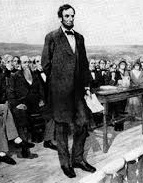 This brief oration is arguably the most important speech of the 19th Century – maybe in all of American history. In approximately three minutes, President Lincoln deftly redefined the purpose and scope of the Civil War and charged his audience and all future Americans with the “great task remaining before us” of extending full American-ness to all people, as apparently both the Founders and the dead soldiers being commemorated that day had intended – although that would have come as news to many of them, had they been alive to hear it.
This brief oration is arguably the most important speech of the 19th Century – maybe in all of American history. In approximately three minutes, President Lincoln deftly redefined the purpose and scope of the Civil War and charged his audience and all future Americans with the “great task remaining before us” of extending full American-ness to all people, as apparently both the Founders and the dead soldiers being commemorated that day had intended – although that would have come as news to many of them, had they been alive to hear it. Little wonder, looking at this speech a masterpiece of imagery, language, and manipulation for the good of mankind, and in so few words – that we can almost SEE the white dove descending from heaven to whisper the words in Lincoln’s ear. Less romantic is the idea that good writing – like good anything – is more often the product of years of effort, study, and practice.
Little wonder, looking at this speech a masterpiece of imagery, language, and manipulation for the good of mankind, and in so few words – that we can almost SEE the white dove descending from heaven to whisper the words in Lincoln’s ear. Less romantic is the idea that good writing – like good anything – is more often the product of years of effort, study, and practice.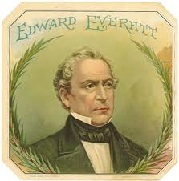 Everett did indeed speak for somewhere around three hours, but that wasn’t considered excessive, nor was it tiring to hear. This was a pre-Xbox, pre-Facebook, pre-RockfordFiles nation. Life was in many ways slower and oration was high entertainment when done well – and Everett was the Paul McCartney of speechifyin’. A bit on the long side of his peak, he was nevertheless legendary for leading the audience through whatever rhetorical journey he chose, and by all accounts that day he was a master.
Everett did indeed speak for somewhere around three hours, but that wasn’t considered excessive, nor was it tiring to hear. This was a pre-Xbox, pre-Facebook, pre-RockfordFiles nation. Life was in many ways slower and oration was high entertainment when done well – and Everett was the Paul McCartney of speechifyin’. A bit on the long side of his peak, he was nevertheless legendary for leading the audience through whatever rhetorical journey he chose, and by all accounts that day he was a master.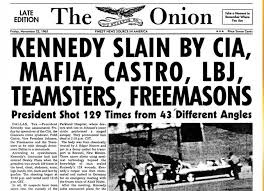
 The idea that 9/11 was an inside job or that MLK was killed by the FBI is disturbing enough, but the alternatives are worse – that individuals or small groups of people, without the knowledge or control of those tasked with keeping us safe, did the worst of big bad things no one could anticipate or stop. We are creatures who want desperately to see order in our surroundings, and to claim some element of control over even the least controllable parts of our lives. A massive conspiracy by a large, powerful organization or sly government entity may be loathsome, but it’s not quite so terrifying as the unpredictability of the alternatives.
The idea that 9/11 was an inside job or that MLK was killed by the FBI is disturbing enough, but the alternatives are worse – that individuals or small groups of people, without the knowledge or control of those tasked with keeping us safe, did the worst of big bad things no one could anticipate or stop. We are creatures who want desperately to see order in our surroundings, and to claim some element of control over even the least controllable parts of our lives. A massive conspiracy by a large, powerful organization or sly government entity may be loathsome, but it’s not quite so terrifying as the unpredictability of the alternatives.